 I'm starting to think that Nightwing might've been better off if they'd just killed him in Infinite Crisis. The further and further along this series has gotten - my reading culminating for now, at least, in Mobbed Up - the worse and more directionless it's gotten. They've seemingly tried just about every possible plot twist that they could imagine: Dick becomes a cop, Dick has a kid, Dick goes undercover, Dick becomes a frickin' mob enforcer.
I'm starting to think that Nightwing might've been better off if they'd just killed him in Infinite Crisis. The further and further along this series has gotten - my reading culminating for now, at least, in Mobbed Up - the worse and more directionless it's gotten. They've seemingly tried just about every possible plot twist that they could imagine: Dick becomes a cop, Dick has a kid, Dick goes undercover, Dick becomes a frickin' mob enforcer.C'mon...this is just crap. I have no clue where the storyline that lead to this was, nor do I care at all. Nightwing's character was written as being upstanding enough that there's no way at all that the actions of this trade are even remotely within that character.
This is piece of dreck that should be set free and slaughtered from the "One Year Later" jump. Nightwing has never found any sort of direction as a series, and it seems that it never is going to. Let it go, folks. It's toast.
 The end of Greg Rucka's run really doesn't do much of a job selling the otherwise consistently high quality of the rest of his run. This trade is a jumbled mess trying to put together three different, very disparate storylines - the disappearance of the Olympian Gods, the battle between warring Amazonian tribes, and the coming/blossoming Infinite Crisis.
The end of Greg Rucka's run really doesn't do much of a job selling the otherwise consistently high quality of the rest of his run. This trade is a jumbled mess trying to put together three different, very disparate storylines - the disappearance of the Olympian Gods, the battle between warring Amazonian tribes, and the coming/blossoming Infinite Crisis.Rucks does about as much as he can manage with the storyline, providing an abortive battle for the control of Thymiscaria (or however it's spelled) and some sort of semi-understandable reasons for the Olympian Gods to do something or other about leaving this immortal realm.
The reasons don't really matter as the volume jumps back and forth between the storylines all while allowing Wonder Woman to do something about turning herself in to the United Nations for killing Maxwell Lord. She seems to think that she's no better than a normal person while also showing that she knows better than normal people and she has to ignore the same rules she forced herself under.
Read the rest of Rucka's run. It's far better than this trade's finale suggests.
Two not very good trades in a row. Let's see what we can do to change that around.
 Ah, Ultimate Iron Man - finally some quality comic book action this go 'round. This is a very worthy addition to the ever impressive Marvel Ultimates Universe, allowing us to understand how this version of Tony Stark was born as a genius and aged into an interesting character.
Ah, Ultimate Iron Man - finally some quality comic book action this go 'round. This is a very worthy addition to the ever impressive Marvel Ultimates Universe, allowing us to understand how this version of Tony Stark was born as a genius and aged into an interesting character.Stark isn't the genius drunkard of Marvel's Earth-616. Instead, he's a child born with a couple of rather odd mutations because of his mother's scientific experimentations during Tony's gestation. Tony has more neural tissue than a normal person, and the trade off is that he's always in pain - until his first drink of champaigne. He's also a total mechanical genius who puts together a suit to protect himself and do a bit of defense contracting.
The writing is tight, and the twists from the original Iron Man storyline are excellent additions to the mythos. It all comes together into an excellent read, one that could have gone on much longer than the five-issue miniseries that it was written to be. Quality read...the first quality of the posting.
 Jarhead isn't as bad as some folks made it out to be. It's a story of one soldier who is trained to kill anonymously and from long range. He spends his entire time in the Iraq war - Desert Shield cum Desert Storm and never fires a single shot. The entire movie is spent telling the story of time being killed, waiting, wondering about the girlfriends back home.
Jarhead isn't as bad as some folks made it out to be. It's a story of one soldier who is trained to kill anonymously and from long range. He spends his entire time in the Iraq war - Desert Shield cum Desert Storm and never fires a single shot. The entire movie is spent telling the story of time being killed, waiting, wondering about the girlfriends back home. There's almost no action - certainly no real fighting - but we are given some phenomenal images of recreations of the burning oil fields of Kuwait as the soldiers attempt to cope with the destruction and isoltation, their own need for and avoidance of death and destruction.
There are great moments in this film. The burning oil fields, in particular, are the most striking images, staying with me after the film. Little elese, however, does. The film is a film of waiting and hoping - but never for anything that is quite definable or grasped by the filmmakers. Jarhead doesn't work, but it's a decent attempt.
I think, however, that it was done much better in The Thin Red Line.
 Time for a random movie from the shelves of the Sharonville branch library. This one was Criminal, chosen because of the two big name members of the cast: Maggie Gyllenhaal and John C. Reilly. Both are pretty quirky, quality actors, the kind who haven't yet found a movie that they could truly headline entirely on their own - though Secretary came pretty close for Mags.
Time for a random movie from the shelves of the Sharonville branch library. This one was Criminal, chosen because of the two big name members of the cast: Maggie Gyllenhaal and John C. Reilly. Both are pretty quirky, quality actors, the kind who haven't yet found a movie that they could truly headline entirely on their own - though Secretary came pretty close for Mags.THis film is a tale of a con man conning a con man, both of whom get double crossed in the end - maybe. It's not entirely clear until the very end of the film who's been pulling the strings for the whole film, and once it does become clear, the movie ends well. Until then, however, the movie is a bit too clever for its own good, suggesting - but not quite revealing - an increasingly complex level of twists and double crosses, the two main characters never showing enough trust for each other to make either entirely likeable.
The film is clever. It's also well acted. The problem is that it's a bit too clever for its own good, and the characters aren't engaging enough to draw the viewer entirely into any emotional investment in the plotlines.
Criminal isn't quite good enough to be fully recommended, but it's not bad. The ending made for a much better film than did the rest of the movie. Two thumbs up for Maggie Gyllenhaal, though, who continues to choose quirky films while putting together a pretty decent resume so far.
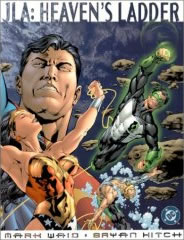 The oversized JLA: Heaven's Ladder isn't a very good story. To quote the Silver Bullet review:
The oversized JLA: Heaven's Ladder isn't a very good story. To quote the Silver Bullet review:Heaven's Ladder is without a doubt the dumbest story - if you can call it that - since Mark Waid's "genius" reasoned that the JLA could not enter No Man's Land and do their job because of the infestations of Big. Yellow. Birds.The plot is stupid. The artwork is overwraught. The concept is dumb.
Heaven's Ladder attempts to be thought-provoking only to fail miserably. A child can see how this story misses the basics. It fails to entertain because it is too busy expounding upon an intensely parochial exploration of religion both real and fictional. It fails to distinguish the characters through their dialogue.
And it's a weird size. Why? Why? Why?
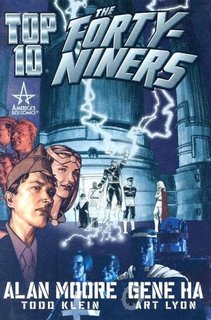 So much crap in the superhero genre - which makes Alan Moore's Top 10: The Forty-Niners look so much more like an absolute gem.
So much crap in the superhero genre - which makes Alan Moore's Top 10: The Forty-Niners look so much more like an absolute gem. The graphic novel is a prequel to Moore's maxi-series Top 10 which I haven't been able to hunt down from the library just yet, and all of the reviews state what I'll state: The Forty-Niners is excellent...not the finest that Moore's ever written, but excellent.
Moore's tale tells some of the backstory of Neopolis, the setting for Top 10, a city where everyone is superpowered, where the United States government has legislated that all these folks go.
The story could go in all sorts of directions, and does tease a few of those: vigilante powder keg, action adventure, mystery; but the true story is of the small, totally human missteps, slights, and discriminations that the characters are a part of. Using superheroes, Moore has crafted an entirely human tale.
The characters aren't black and white charactures as we often see of stories set in the 1940's - with gorgeously pale artwork from Gene Ha. Instead, they are rich, nuanced people who allow Moore to reflect on the changes that came in our society in the post-war years.
Excellent...and full of tons of easily-missed details...
 It took me a long while to get into Kurt Vonnegut's Breakfast of Champions. The early parts are so disjointed - intentionally so - and hard to hold onto the story thread that I struggled with enjoying the book (on tape, admittedly).
It took me a long while to get into Kurt Vonnegut's Breakfast of Champions. The early parts are so disjointed - intentionally so - and hard to hold onto the story thread that I struggled with enjoying the book (on tape, admittedly).By the end, however, I was absolutely ready to yet again sing Vonnegut's praises most highly.
By the end of the book, Vonnegut has crafted a gorgeous exploration of the relationship between an author and the characters he has created, how each influences the other rather than the typical one-way street.
Vonnegut inserts himself deeply into the story and brings forth characters from a great number of his books: Eliot Rosewater, Kilgore Trout, Francine Pefko, Kazak, and many more. The book is Vonnegut's gift to himself on the occasion of his fiftieth birthday, on which he has chosen to set free his creations.
Vonnegut's novel is spectacular and difficult. He has crafted a gorgeous work of meta-fiction. Next up for me from his work is either going to be Cat's Cradle or Galápagos. It likely won't be the supposedly rought translation of the book into film.
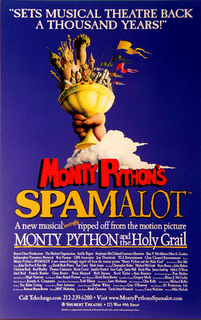 Oh my lord, did Spamalot stink.
Oh my lord, did Spamalot stink.At $50 a seat for the cheap seats three levels above the deck, we found ourselves looking down on a number of recycled gags, hackneyed jokes, and few - if any - original ideas. From the moment nearly every character stepped on-stage, the punchlines and situations were predictable and rote.
Few original laughs were had in the evening - the French castle guards being the lone bright spot - and the only people that I would predict truly enjoyed the night were the people who watch the film week in and week out.
If you laugh at Monty Python's The Holy Grail regularly and continue to enjoy it thoroughly, then you'll likely love the traveling performance of the musical.
If you don't, you won't.
C'mon, to give you an idea of how thoroughly devoid of funny gags this thing was, they actually broke into Peanut Butter Jelly Time.
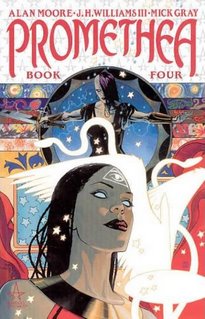 With Book 4, the Promethea series continues to wander further and further from traditional comic storytelling as Promethea wraps up her journey through the Kaballic (sp?) and search for...um...search for something.
With Book 4, the Promethea series continues to wander further and further from traditional comic storytelling as Promethea wraps up her journey through the Kaballic (sp?) and search for...um...search for something.I've wavered from positive to negative about Promethea in my journey through the series, and this volume finds me feeling more of the same. In a paper for one of my Kent State classes two weeks ago, I commented that what we're doing on the internet educationally is, to a great extent, no different from what could be done without the internet. We're reading text and watching videos, things we could entirely have done (with a different format, admittedly) before we went online.
Alan Moore's Promethea certainly cannot be accused of doing the same with graphic novels. Moore takes steps so far away from anything that other graphic novel writers and artists have done that the series is a true revelation. As such, however, it is often difficult to follow and enjoy. This might be a comment on my intelligence, my understanding, or even my openness to new things - or it might be that Promethea doesn't quite reach what Moore is trying to grasp for.
The latter part of this volume is, however, more conservative and, hence, more enjoyable for me, as Promethea returns to Earth and had to battle her stand-in to retain the title of current incarnation Promethea.
For all the faults, Moore's series has me by the guts as I am now on a search to find the fifth collected volume, finishing out the series.
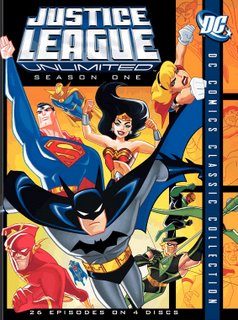 I broke down and grabbed Justice League Unlimited: Season 1 and worked my way through the four discs and twenty-six episodes.
I broke down and grabbed Justice League Unlimited: Season 1 and worked my way through the four discs and twenty-six episodes.It's a simple thing to say that the series was phenomenal, absolutely stunning and geeked out to the highest.
I think I watched all the episodes in three sittings - maybe four, spending most of the time slack-jawed at the amazing comic book goodness that was almost more than I could take. Cameo appearances, in jokes, humor, drama, romance, and a masterful story arc that spanned the latter half of the first season and the entirety of the second season (both were released under the Season One label on the DVD set) make for what has to be one of my all-time favorite comic cartoon series and one that I was happy to drop my $45 to own.
The creators and writers clearly have a deep understanding of and love for their source material. Though they do often appear willing to part from the absolutely pure source material, they through in so many references and off-hand comments that the geekiest of the geeky viewers will have his (let's be honest, not many her) heart soaring.
It's an absolute knockout and a note for note perfect series, from the first notes to the last lines of the second season: Who guards the guardians.
Amazing, phenomenal, an total out and out must-own for comic fans.
Go buy it...and soon.
 I was kind of surprised at how enjoyable Joe versus the Volcano was. I'd heard pretty awful things about it since its release a decade and a half back now, but it turned out to be a pretty enjoyable bit of fluff.
I was kind of surprised at how enjoyable Joe versus the Volcano was. I'd heard pretty awful things about it since its release a decade and a half back now, but it turned out to be a pretty enjoyable bit of fluff.It's a little heavy with the strong imagry - the first bunch of scenes are so grey and industrial as to be overbearing and the orange drink on the islanders is a bit over the top - but it sort of works to create an atmosphere that's over the top enough that the ridiculous actions and luck of the characters don't seem too impossible.
Meg Ryan - in three roles, one of which has her in full on cutest of the 80's and 90's mode - does a nice supporting bit beside Tom Hanks who was taking a bit of a break from his multiple Oscar-winning years.
All in all, it's a fun lark but nothing too substantial or marvelous. Loads of people like the flick, though, so it must have something going for it.
 This summer was shaping up to have been a classic one in American, major-label comic books. DC was rocking Infinite Crisis - the long-anticipated, much foretold sequel to the excellent Crisis on Infinite Earths, and Marvel was all geeked about Civil War
This summer was shaping up to have been a classic one in American, major-label comic books. DC was rocking Infinite Crisis - the long-anticipated, much foretold sequel to the excellent Crisis on Infinite Earths, and Marvel was all geeked about Civil WarAnd then everything crapped out.
This volume of Superman: Infinite Crisis is a volume-long battle between the Supermen of Earths 1 and 2, each blow between the two producing - I swear I'm not making this up - rippled in the time stream. Somehow, every time they hit each other, they cause different famous comic events to have happened differently. One Superman doesn't die to Doomsday. The other dies to the Anti-Monitor. One banishes Dr. Light instead of mind-wiping him. The other does something. It got confusing - with the artwork doing to keep things straight.
The concept is interesting - taking a look at the major events of Supes's last few decades and seeing how things would have gone differently had slight changes been made, but it just doesn't work.
I become less and less enchanted with the various permutations of Infinite Crisis with every review that I read, but I'll still slog my way through the collection - which appears to be different from the originals, interestingly.

No comments:
Post a Comment